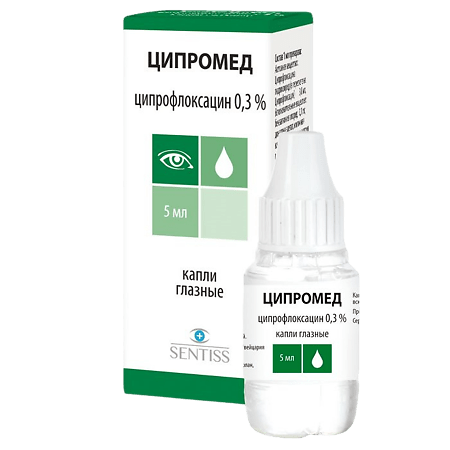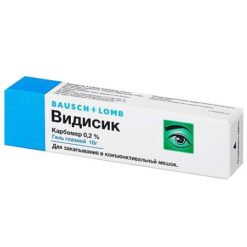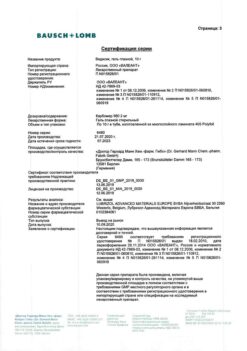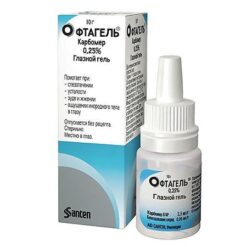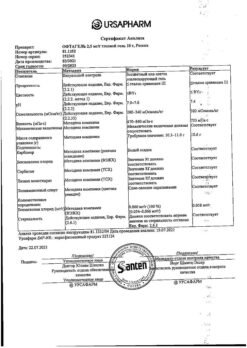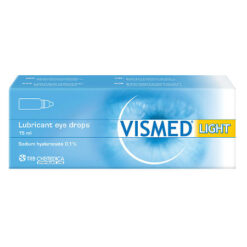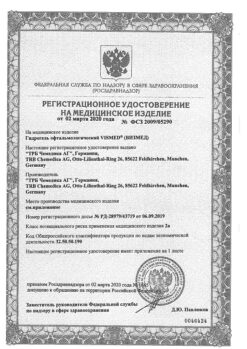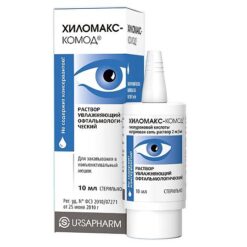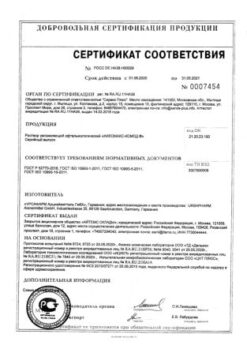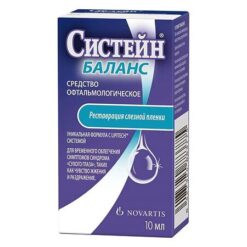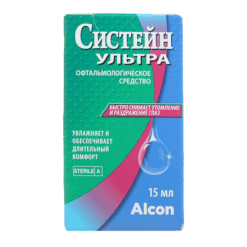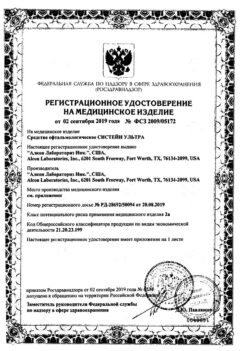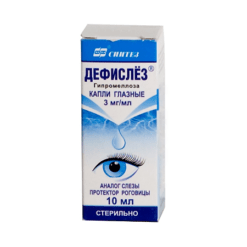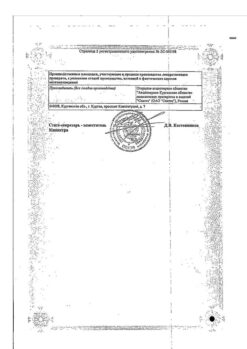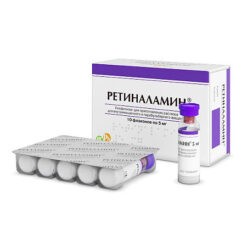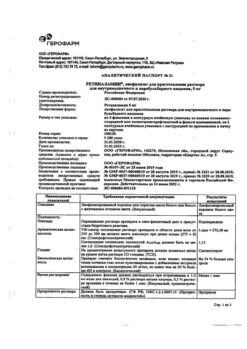No products in the cart.
Tsipromed, eye drops 0.3% 5 ml
€4.06 €3.61
Description
Cyprofloxacin is an antimicrobial drug from the group of fluoroquinolones with a broad spectrum of antibacterial action and bactericidal effect.
The spectrum of antibacterial action of ciprofloxacin includes Gram-negative microorganisms: Esherichia coli, Salmonella spp., Shigella spp., Proteus spp. (indole positive and indole negative), Morganella morganii, Citrobacter spp, Klebsiella spp., Enterobacter spp., Vibrio spp., Campylobacter spp., Hafnia spp., Providencia stuartii, Haemophilus influenzae, Pasteurella multocida, Pseudomonas spp., Gardnerella spp., Legionella pneumophila, Neisseria spp., Moraxella catarrhalis, Acinetobacter spp., Brucella spp., Chlamidia spp.
The following Gram-positive microorganisms are also sensitive to ciprofloxacin: Staphylococcus spp., Streptococcus pyogenes, St. agalactiae, Corynebacterium diphtheriae, Listeria monocitogenes. The drug is mildly toxic.
Indications
Indications
Infectious and inflammatory diseases of the eye and its appendages caused by microorganisms sensitive to the drug:
Acute and subacute conjunctivitis.
Keratitis.
Anterior uveitis.
Blepharitis and other inflammatory diseases of the eyelids.
Dacryocystitis.
Prevention and treatment of infectious complications in injuries of the eye and its appendages and during operations on the eyeball.
Pharmacological effect
Pharmacological effect
Ciprofloxacin is an antimicrobial drug from the group of fluoroquinolones, has a wide spectrum of antibacterial action and has a bactericidal effect.
The drug inhibits the enzyme DNA gyrase of bacteria, as a result of which DNA replication and the synthesis of bacterial cellular proteins are disrupted. Ciprofloxacin acts both on microorganisms that are reproducing and those in the dormant stage.
The spectrum of antibacterial action of ciprofloxacin includes gram-negative microorganisms: Esherichia coli, Salmonella spp., Shigella spp., Proteus spp. (indole-positive and indole-negative), Morganella morganii, Citrobacter spp., Klebsiella spp., Enterobacter spp., Vibrio spp., Campylobacter spp., Hafnia spp., Providencia stuartii, Haemophilus influenzae, Pasteurella multocida, Pseudomonas spp., Gardnerella spp., Legionella pneumophila, Neisseria spp., Moraxella catarrhalis, Acinetobacter spp., Brucella spp., Chlamidia spp.
Gram-positive microorganisms are also sensitive to ciprofloxacin: Staphylococcus spp., Streptococcus pyogenes, St. agalactiae, Corynebacterium diphtheriae, Listeria monocitogenes. The drug is low toxic.
Special instructions
Special instructions
If the patient wears soft contact lenses, then he should not use Tsipromed, because the preservative may be deposited in soft contact lenses and have adverse effects on ocular tissue.
You should remove hard contact lenses before instilling the drug and put them back on only after 15 minutes.
When using other ophthalmic drugs, the interval between their administration should be at least 5 minutes.
Immediately after instillation of the drug, there may be a decrease in visual clarity and a slowdown in mental reactions, which can reduce the ability to actively participate in street traffic, maintain machines, or perform work without support. This occurs to an even greater extent when the drug is used simultaneously with alcohol.
Active ingredient
Active ingredient
Ciprofloxacin
Composition
Composition
Eye drops 0.3% in the form of a clear solution from colorless to pale yellow.
1 ml – ciprofloxacin (in the form of hydrochloride) 3 mg.
Excipients:
benzalkonium chloride,
sodium edetate,
lactic acid,
sodium chloride,
sodium hydroxide,
water d/i.
Pregnancy
Pregnancy
Tsipromed is contraindicated for use during pregnancy. If it is necessary to use the drug during lactation, breastfeeding should be stopped.
Use in children
Contraindication: children under 1 year of age.
Contraindications
Contraindications
pregnancy;
lactation (breastfeeding);
children under 1 year of age;
hypersensitivity to the components of the drug or to other fluoroquinolones.
Side Effects
Side Effects
A slight burning sensation for 1–2 minutes (immediately after instillation); itching, soreness, hyperemia of the mucous membrane of the eye, sensation of a foreign body in the eyes, unpleasant taste in the mouth immediately after instillation, decreased visual acuity, allergic reactions, swelling of the eyelids, photophobia, lacrimation, the appearance of a white crystalline precipitate in patients with a corneal ulcer, keratitis, keratopathy, the appearance of spots or infiltration of the cornea, the development of superinfection.
Interaction
Interaction
Ciprofloxacin solution is incompatible with drugs with a pH value of 3-4, which are physically and chemically unstable.
Overdose
Overdose
If Tsipromed is accidentally taken orally, there are no specific symptoms.
The following symptoms are possible: nausea, vomiting, diarrhea, headache, fainting, anxiety.
Treatment: it is necessary to ensure sufficient fluid intake, maintaining an acidic urine reaction to prevent crystalluria. If necessary, carry out symptomatic therapy.
Storage conditions
Storage conditions
In a place protected from light, at a temperature not exceeding 25 °C (do not freeze)
Shelf life
Shelf life
2 years
Manufacturer
Manufacturer
Sentiss Pharma Pvt.Ltd, India
Additional information
| Shelf life | 2 years |
|---|---|
| Conditions of storage | In the dark place at a temperature not exceeding 25 °C (do not freeze) |
| Manufacturer | Sentiss Pharma Pvt.Ltd, India |
| Medication form | eye drops |
| Brand | Sentiss Pharma Pvt.Ltd |
Related products
Buy Tsipromed, eye drops 0.3% 5 ml with delivery to USA, UK, Europe and over 120 other countries.

